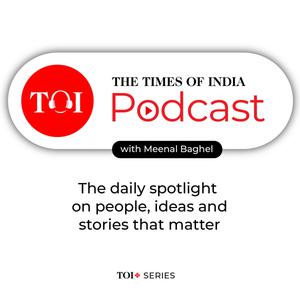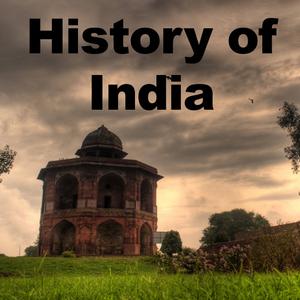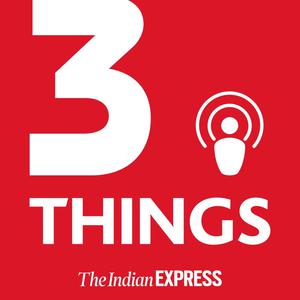
The Times Of India Podcast
Times Of India
The Times of India podcast expands storytelling and reportage from India’s largest newsroom. We put the spotlight on ideas, people and stories that matter from Monday to Friday. To listen to more podcasts like this, please subscribe to TOI+ at https://timesofindia.indiatimes.com/toi-plus
- 39 minutes 40 secondsClimate movement's mistake, Donald Trump's 2009 reality and Indians writing from World War 1
A conversation with Amitav Ghosh, after the release of his latest book Wild Fictions, in which he tells us about the turning point for him as a writer and more
20 January 2025, 12:17 pm - 26 minutes 22 secondsWhat a Maha win means for BJP in the state and country
Suhas Palshikar, co-director of electoral think-tank Lokniti and an eminent political scientist, explains what this Maharashtra electoral verdict means for the future of opposition parties and why the BJP would want to get rid of its allies in the state.
4 December 2024, 10:42 am - 31 minutes 54 secondsIdeas before their time
Eminent historian and author Ramchandra Guha talks about his latest book 'Speaking with Nature' about individuals who could be called India's first environmentalists, documenting noble failures, and whether environmentalists are destined to be ignored.
1 November 2024, 5:29 am - 34 minutes 31 secondsWhy this Maharashtra election won't end political chaos in the state
First, Sanjay Kumar from Lokniti-CSDS talks with Alka Dhupkar about what a Lokniti-MIT SOG survey says about political parties' prospects in the upcoming election.
Then, co-director of Lokniti and eminent political scientist Suhas Palshikar explains why this election won't sort out the political chaos in the state. He also explains why this election will be a very high-stakes one for two leaders.
25 October 2024, 8:07 am - 17 minutes 23 secondsKilling in the streets
The killing of former Maharashtra minister Baba Siddique has raised questions about the revival of gang violence in Mumbai. Rashmi Rajput, who writes on crime and investigating agencies for The Economic Times, explains the impact of the killing and how it changes things in a city that had gotten used to not hearing about extortion calls.
18 October 2024, 11:46 am - 28 minutes 36 secondsCaste behind bars
Journalist Sukanya Shantha was recently thanked by the Supreme Court for her reporting on caste-based labour practices and caste-based segregation in many of India's prisons. She speaks with Alka Dhupkar and Arun George about how caste determines what you do in jails, why these practices still exist and the challenge with ending them.
11 October 2024, 12:30 am - 28 minutes 37 secondsWhen the Prime Minister comes calling
Political scientist Suhas Palshikar explains the issues with the Prime Minister turning up at the Chief Justice's residence for Ganeshotsav. He also explains the problem with judges and government employees talking about links with the RSS and what it means for the RSS to be making statements that seem to target the PM.
26 September 2024, 12:30 am - 24 minutes 8 secondsWhy this Jammu and Kashmir election is crucial
Shakir Mir, who writes on Jammu and Kashmir for TOI+ and other publications, talks about why this year's assembly elections are so important in the region despite full statehood unlikely to be restored any time soon. He explains why there's so much enthusiasm for this election and which parties are expected to make an impact.
15 September 2024, 12:30 am - 17 minutes 3 secondsAn unconventional parent
Patruni Chidananda Sastry talks to Labanya Maitra about the challenges of being a drag queen and parent and dealing with the hate that comes with publicly acknowledging one's unconventional choices.
5 September 2024, 12:30 am - 24 minutes 54 seconds'Nobody listened when women said things'
Bina Paul - one of the founding members of the Women in Cinema Collective - talks about the fallout of the Justice Hema committee report on the Malayalam film industry. She explains why the report matters, why sexual harassment is rampant in the film industry and what needs to be done now to correct things.
28 August 2024, 3:28 am - 49 minutes 23 secondsHow the Supreme Court has shaped reservations in India
Supreme Court lawyer Disha Wadekar explains the apex court's latest verdict that deals with the contentious subject of sub-quotas within reservations for scheduled castes and scheduled tribes. She also decodes the Supreme Court's handling of reservations over the decades and what's worrying about multiple judgements regarding reservations.
14 August 2024, 12:30 am - More Episodes? Get the App
Your feedback is valuable to us. Should you encounter any bugs, glitches, lack of functionality or other problems, please email us on [email protected] or join Moon.FM Telegram Group where you can talk directly to the dev team who are happy to answer any queries.
 The History of India Podcast
The History of India Podcast
 3 Things
3 Things
 ThePrint
ThePrint
 In Focus by The Hindu
In Focus by The Hindu
 Finshots Daily
Finshots Daily
 The Morning Brief
The Morning Brief